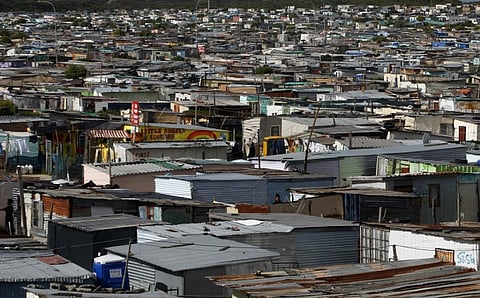South Africa: Violent crimes driven by poverty and unemployment
Lack of intelligence on criminal gangs hampers South Africa’s police

CAPE TOWN, South Africa: The South African Police Service (SAPS) is not only fighting crime, but the unemployment and poverty that pushes people into alcoholism, addiction and violence.
And this is a battle that it cannot win on its own. “Contact crimes, like murder and attempted murder, are up, but much of these are driven by unemployment, poverty and alcohol and drug abuse. It is not often recognized that the causes of these crimes are outside the reach of the police,” explained Johan Burger of the Institute of Security Studies, in South Africa.
Burger was speaking to Gulf News after the release of the country’s latest crime statistics. The figures, which reflect crimes reported to the police in the past year, are a mixed bag.
While the trend in contact crimes is up, in robbery and sexual offences it is pointing down, according to some analysis of the figures. But, there is devil in the detail: While common robbery may be down, robbery with aggravating circumstances, is up.
And while Burger recognizes that the police service has done much to deal with past criticism that the statistics are not accurate, he remains concerned that some crimes are under-reported. “The statistics are a fair reflection of the crimes reported to the police. But, many crimes are often not reported, because of a lack of trust in the police and confidence in their ability to arrest the offenders,” he said.
Also, the police service can do more to tackle criminal gangs and syndicates. “The problem here is a lack of effective crime intelligence. This must be sorted out,” said Burger.
The South African police services has had a period of instability among its top management and some of its officers been accused of initiating politically-motivated investigations. While the controversies continue, the Acting National Police Commissioner, Lieutenant-General Khomotso Phahlane, is winning some plaudits for his back-to-basics policing strategy. In a recent interview Phahlane committed the police to increasing their visibility, dealing with complaints more professionally and strengthening their investigative capacity.
“He is doing the right things to turn the police service around and rebuild trust and confidence in them,” said Burger.
But a report released by the South African Presidency earlier this month shows that not much changed for the poor in the country between 2008 and 2015. The study showed that with many South Africans trapped in poverty, the middle class in the country only makes up about 15 percent of the total population.
“Unless we get a grip on the social and economic causes of lawlessness and strengthen crime intelligence, the figures are likely to go up over the next two years,” predicted Burger.
But he does not want to scare visitors away from South Africa. “South Africa is a country that is experiencing relatively high level of crime, but it is possible to stay safe with a bit of care and common sense. Take the advice of the people you are staying with, locals and guides, and make sure you know where the danger spots are,” he recommended.
Sign up for the Daily Briefing
Get the latest news and updates straight to your inbox



